Flying falcon heralds return of Lacons, brewery axed by national giant in 1968
Added: Wednesday, June 5th 2013

The falcon is flying again. Lacons, once a powerhouse brewery in East Anglia, with pubs as far away as London, has re-opened after a gap of 45 years. Three new beers were launched in mid-May at Norwich’s annual celebration, City of Ale.
Lacon’s falcon logo graced a large tied estate of 300 pubs, 50 of which were in London. The brewery in Great Yarmouth covered three acres. Production amounted to 100,000 barrels a year and half that figure was accounted for by sales in London.
The company owned 171 pubs in Great Yarmouth alone and sent beer to London by boat until a rail link was built in the 19th century. It was a brewery with a long and proud history, founded in 1760. In 1814 Lacons supplied more than 20,000 pints of beer to a festival dinner held in the town to celebrate the final defeat of Napoleon’s France.
Lacons closed in 1968. It hadn’t failed. It was still brewing mild, bitter, stout, old ales and a host of other brands, including bottled Audit Ales for both Cambridge and Oxford colleges. So why did it shut down?
The answer lies in the crazy economics of the brewing industry in the 1960s. Twenty miles away in Norwich, Watneys from London bought and eventually closed three breweries in the city.
In Great Yarmouth, the directors of Lacons took the fateful decision to float on the stock market in 1952 and five years later sold 20% of the business to another London brewer, Whitbread. In 1965, Whitbread bought the business for £3.2m, equivalent to £50m today. In 1968 the chairman of Lacons told the assembled workforce that the brewery would close with the loss of 150 jobs.
The site became a Whitbread depot and today houses a supermarket. When CAMRA, the Campaign for Real Ale, was launched in 1971 it dubbed Norfolk “a beer desert”, shorn of all its great breweries in Norwich and Yarmouth.
Why did Watneys and Whitbread act in a manner that showed scant regard for the interests of beer drinkers in Norfolk? The answer is simple: they wanted the local brewers’ pubs. They kicked out all the local beers and replaced them with their national keg brands, Watney’s Red and Whitbread Trophy. With lager sales starting to take off, the two London brewers could also fill the Norfolk pubs with their contract brews, Holsten and Heineken.
Times have changed. Watneys is now just a bad dream and Whitbread left brewing in 2000 to concentrate on budget hotels and coffee shops. Norfolk today has one of the biggest number of small breweries in the country, with Woodforde’s growing to regional size and status.
The new Lacon’s is not a hole-in-the-corner operation, either. It has been meticulously planned by Mick Carver and Trevor Hourican, who run drinks wholesaler JV Trading in Lowestoft. Carver was intrigued by the large number of buildings in East Anglia that still had the Lacon’s falcon carved in the brickwork.
He researched the company’s history and became keen to re-start brewing using the Lacon’s name. As a result of his drinks business, founded in 1993, he had good connections with AB InBev, the global brewing giant that had taken over Whitbread’s brands and trademarks. As a result, he was able to negotiate the purchase of Lacon’s registered trademarks and intellectual property rights.
Many months of planning came to fruition last month when the new Lacons Brewery opened in attractive buildings on Main Cross Road overlooking the North Sea and close to the famous Pleasure Beach. Carver and Houlican have worked closely with William Lacon, son of the last member of the family who worked in the old brewery: Lacon was on hand to help unveil a commemorative plaque on the opening day (main picture above shows Mick Carver, left, with William Lacon in the Brewery Tap at the new site).
£250,000 has been invested in the new brewery, which includes a tap where visitors can sample the beers, and a visitor centre and small museum that houses the history of Lacons, with old brewing recipe books, pub signs and bottles.
The current brewing plant can produce 100 casks a week but this will grow to 400 when the kit is expanded to 20 barrels later this year. The head brewer is the vastly experienced Wil Wood, who has brewed with Oakham Ales in Peterborough and Fyne Ales in Scotland.
Wood has been able to get samples of the original Lacon’s yeast strains, stored in the National Collection of Yeast Cultures that’s handily based in Norwich. His first three cask beers are modern ales that will appeal to younger drinkers: Encore (3.8%), Legacy (4.4%) and Affinity (4.8%), all brewed with Norfolk-grown Maris Otter barley.
Encore is brewed with the addition of crystal malt and the hops are Citra and Centennial. Legacy is pale malt only with Amarillo and Cascade hops, while Affinity has additions of crystal and black malt, with Nelson Sauvin and Simcoe hops.
There are plans to extend the range to include some of the original Lacon’s recipes. The first beers were unveiled at City of Ale in Norwich. Now in its third year, this magnificent event celebrates the revival of brewing in Norfolk and the great pubs that support it.
Beer is flying in East Anglia. And so is the falcon.
*Falcon Brewery, Main Cross Road, Great Yarmouth, Norfolk. www.lacons.co.uk. Thanks to Vist Norwich, City of Ale, Maids Head Hotel and Greater Anglia Ttrains.
This is an expanded version of an article that first appeared in the Publican’s Morning Advertiser, 5 June 2013.








